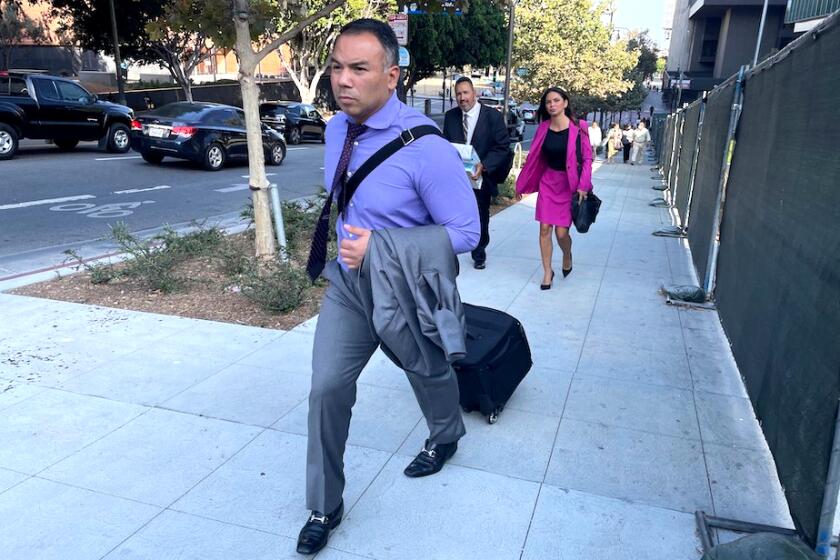O.C. sheriff cites accomplishments
Orange County Sheriff Sandra Hutchens doesn’t have a 2010 election opponent yet, but she laid out what appeared to be a blueprint Monday for how she plans to win voter approval.
Using the end of her first year in office as the hook, Hutchens cited changes she made in jail management, said she had restored public trust in the office and would fire any deputy caught lying in so-called “code of silence” situations. She touched briefly on her handling of concealed weapons permits, saying there are about 200 fewer than a year ago. She said that about half of that reduction resulted from her review. She also encouraged anyone who could show good cause to have such a permit to apply for one.
The issues have been the most publicized and, in some cases, have brought the most controversy to Hutchens’ first 12 months in office. The Board of Supervisors appointed her to fill the term of Michael Carona, convicted earlier this year of witness tampering. He is scheduled to begin serving a 5 1/2 -year federal prison sentence next month.
A retired division chief in the Los Angeles County Sheriff’s Department when appointed, Hutchens has never run for office.
Hutchens inherited a much-maligned jail management system, underscored by the October 2006 beating death of Theo Lacy Jail inmate John Chamberlain by other inmates. A county grand jury and the Orange County district attorney criticized some deputies’ failure to do their jobs and later impeding an investigation of Chamberlain’s death, including lying to the grand jury.
Hutchens, flanked by her command staff, said the changes include installing digital cameras in key locations and replacing paper logs of deputies’ activities with electronic logs that can’t be altered. Supervisory sergeants and lieutenants will inspect the jails more frequently on each shift and sergeants will work with the same deputies on each shift for more continuity, she said.
Addressing another grand jury finding, Hutchens said deputies would not be allowed use of “nonprofessional Internet access” while on duty. The grand jury found that some deputies ignored many of their duties and instead watched TV, movies and played video games -- and in some cases, slept -- in their guard stations.
Jailers will be expected to identify “shot callers” among the inmates -- the common term for prisoners who assume jailhouse control over inmates. Any jail staffer will be required to inform his or her supervisor in a timely manner if another staffer uses force on an inmate, Hutchens said. The district attorney’s office will investigate any jail-related incidents in which death or life-threatening injuries occur.
Much of the early criticism of Hutchens involved her effort to review concealed weapons permits. Monday, she said she took it on early in her tenure to erase public concerns that “guns were given away to friends of the sheriff” and said the permits have declined from more than 1,000 to less than 900.
The “code of silence” issue arose in April when a district attorney’s spokeswoman took the unusual step of saying publicly that deputies changed their stories in an assault case, forcing prosecutors to drop charges against a deputy after jurors couldn’t reach a verdict.
--
More to Read
Sign up for Essential California
The most important California stories and recommendations in your inbox every morning.
You may occasionally receive promotional content from the Los Angeles Times.










